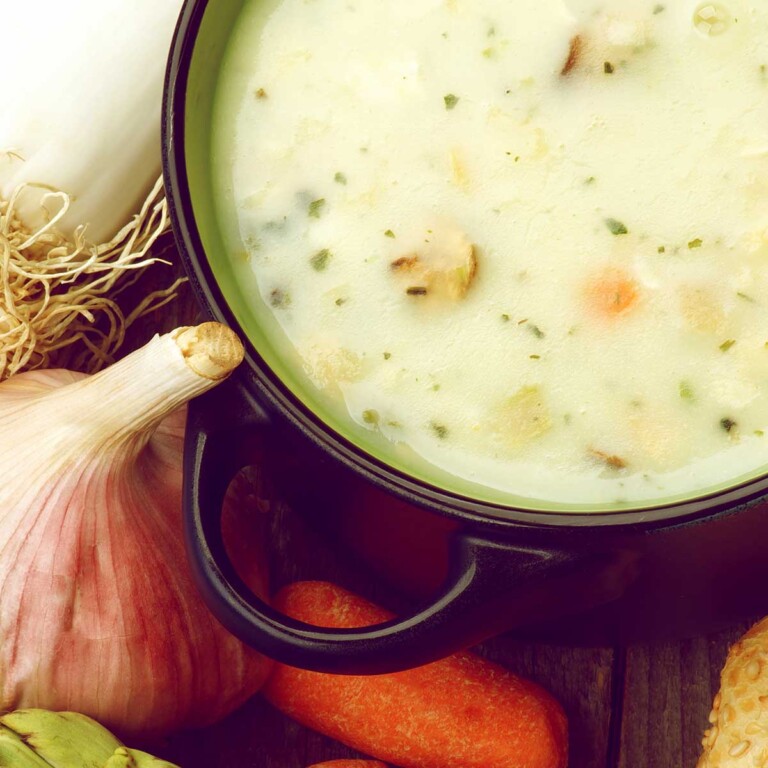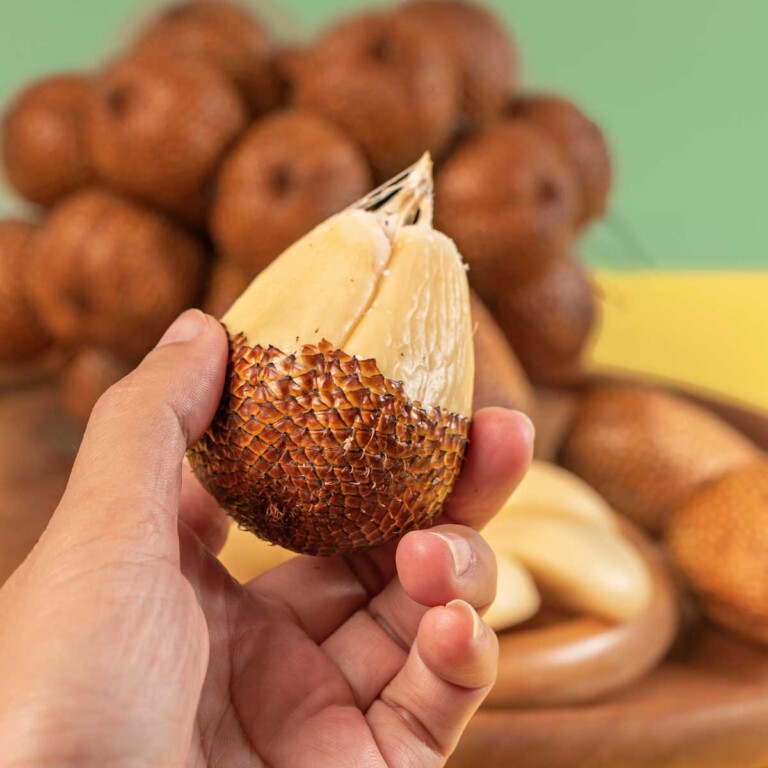Potato Face-Off: Sweet Potato vs Russet Potato
This post may contain affiliate links. If you make purchase after clicking a link, I may receive a commission at no extra cost to you.
Last Updated on December 5, 2023
Potatoes are one of the most versatile and beloved vegetables, however, not all potatoes are the same. We’re going to take a look at sweet potato vs russet potato and explore their similarities, differences, and health benefits to find a winner.

Sweet Potato vs Russet Potato
Before we delve into the details, let’s take a moment to understand the basic differences between these two spuds. The sweet potato belongs to the Convolvulaceae family and is technically a root vegetable, while regular potatoes belong to the Solanaceae family and are a nightshade food.
There are many different types of potatoes: regular white potatoes, purple potatoes, red potatoes, yellow potatoes, and the Yukon gold potato, in addition to different varieties of sweet potatoes.
In this post, we are comparing sweet potatoes Vs russet potatoes.
Sweet Potatoes
Did you know that sweet potatoes are not only delicious but have a high nutritional value? They are an excellent source of vitamin A, vitamin C, and dietary fiber. In fact, one medium sweet potato can provide you with more than double the daily recommended intake of vitamin A!
But that’s not all! Sweet potatoes are also rich in antioxidants, particularly beta carotene, which gives them their vibrant orange color. Antioxidants help protect our bodies from harmful free radicals, which can damage cells and contribute to chronic diseases like cancer and heart disease.

Sweet Potatoes: Appearance
When it comes to appearances, the most common sweet potatoes tend to have a reddish or orange skin with orange flesh. There are also purple sweet potatoes, which tend to be more dry, and white sweet potatoes, which have a yellow or white flesh and less sweet taste.
Check out: White Sweet Potato Recipes
Sweet Potato: Taste & Texture
Sweet potatoes, true to their name, have a naturally sweet taste that intensifies when cooked. Their flesh is moist and smooth, and they have a delightful combination of sweet and earthy flavors.
The texture of sweet potatoes varies based on preparation. Roasting or baking them will result in a soft, creamy texture, while boiling or steaming leads to a firmer, but still tender, consistency.
Sweet Potato: Uses in Cooking
Thanks to its natural sweetness and versatility, sweet potatoes can be used in a wide array of dishes. They pair well with both savory and sweet ingredients, making them a star in soups, stews, casseroles, and even desserts like pies and muffins.

Sweet Potato Nutritional Profile
In addition to their delicious taste, sweet potatoes are packed with nutrients that make them a standout choice in any diet.
Vitamins in Sweet Potatoes
- Vitamin A: Sweet potatoes are rich in beta-carotene, which the body converts into vitamin A. This vitamin is essential for good vision, immune function, and cell growth.
- Vitamin C: Sweet potatoes contain vitamin C, an antioxidant that helps protect cells from damage and supports a healthy immune system.
- Vitamin B6: Sweet potatoes provide vitamin B6, which is important for brain development, hormone production, and the formation of red blood cells.
Minerals in Sweet Potatoes
- Potassium: Sweet potatoes are a great source of potassium, which helps regulate blood pressure and maintain proper heart function.
- Magnesium: These root vegetables contain magnesium, which plays a role in over 300 biochemical reactions in the body and contributes to bone health.
- Manganese: Sweet potatoes provide manganese, a mineral involved in carbohydrate metabolism, collagen production, and antioxidant defense.
Antioxidants in Sweet Potatoes
- Beta-carotene: As mentioned earlier, sweet potatoes are packed with beta-carotene. This antioxidant helps protect against chronic diseases by neutralizing harmful free radicals.
- Anthocyanins: Purple-fleshed sweet potatoes contain anthocyanins, powerful antioxidants that have been linked to reduced inflammation and improved brain function.
Micronutrients in Sweet Potatoes
- Fiber: Sweet potatoes are a good source of dietary fiber, which aids digestion and promotes feelings of fullness.
- Iron: These root vegetables contain iron, an essential mineral necessary for the production of red blood cells and oxygen transport throughout the body.
Sweet Potato Glycemic Index
Sweet potatoes have a relatively lower glycemic index compared to other starchy vegetables, which means they are less likely to cause sharp spikes in blood sugar levels. This makes them a suitable choice for individuals with diabetes or those looking to manage their blood sugar levels.
Sweet Potatoes & Special Diets
- AIP: Yes (Sweet potatoes are a staple with the autoimmune protocol.)
- Paleo: Yes
- GAPS: No
- SCD: No
- Keto: No
- Vegan: Yes

Health Benefits of Sweet Potatoes
The health benefits of sweet potatoes are numerous, making them a valuable addition to any well-balanced diet. One of their standout qualities is their high fiber content, which promotes healthy digestion and may aid in weight management.
- Rich in vitamins: Sweet potatoes are packed with vitamins A, C, and B6, which support immune function and overall health.
- High in fiber: The high fiber content aids in digestion and promotes a healthy gut.
- Antioxidant properties: Sweet potatoes contain antioxidants that protect against cell damage and reduce the risk of chronic diseases.
- Blood sugar regulation: The fiber and complex carbohydrates in sweet potatoes help regulate blood sugar levels.
- Heart health: The potassium content in sweet potatoes promotes heart health by maintaining normal blood pressure levels.
- Anti-inflammatory effects: Certain compounds in sweet potatoes have anti-inflammatory properties, reducing inflammation in the body.
- Eye health: The beta-carotene in sweet potatoes is converted to vitamin A, which supports vision and eye health.
- Weight management: Due to their high fiber content, sweet potatoes can help you feel fuller for longer periods, aiding weight management efforts.
- Skin health: The vitamins and antioxidants in sweet potatoes contribute to healthy skin by promoting collagen production and reducing signs of aging.
- Brain function: The nutrients found in sweet potatoes support brain function and may improve cognitive performance.
- Energy production: Sweet potatoes are rich in carbohydrates, providing a steady source of energy throughout the day.
- Bone strength: The combination of calcium and potassium found in sweet potatoes helps maintain strong bones.
- Digestive health: Sweet potatoes contain resistant starches that act as prebiotics, nourishing beneficial gut bacteria for improved digestion.
- Cancer prevention: Certain compounds present in sweet potatoes have been linked to a reduced risk of certain types of cancer.
- Immune system support: The vitamins and minerals found in sweet potatoes strengthen the immune system, helping to fight off infections and illnesses.
- Anti-stress properties: Sweet potatoes contain magnesium, which helps relax the body and reduce stress levels.
- Anti-aging effects: The antioxidants in sweet potatoes protect against free radicals, slowing down the aging process.
- Muscle recovery: The potassium content in sweet potatoes aids in muscle recovery after exercise.
- Healthy blood circulation: Sweet potatoes support healthy blood circulation due to their iron and copper content.
- Gut health: The fiber in sweet potatoes nourishes the gut microbiome, supporting a healthy digestive system.
Potential Downsides Of Eating Sweet Potatoes
- High carbohydrate content: Sweet potatoes are relatively high in carbohydrates, which can be a concern for individuals following low-carb or ketogenic diets.
- Blood sugar impact: Sweet potatoes have a moderate glycemic index, meaning they can cause a moderate increase in blood sugar levels. People with diabetes or those who need to closely monitor their blood sugar should consume sweet potatoes in moderation and consider pairing them with protein or healthy fats to help stabilize blood sugar levels.
- Oxalate content: Sweet potatoes contain oxalates, which are compounds that can contribute to the formation of kidney stones in susceptible individuals. People with a history of kidney stones may need to limit their intake of sweet potatoes or consult with a healthcare professional for personalized advice.
- Allergies or sensitivities: While rare, some individuals may have an allergic reaction or sensitivity to sweet potatoes. Symptoms could include itching, hives, swelling, or digestive issues. If you experience any adverse reactions after consuming sweet potatoes, it is advisable to seek medical attention.
Russet Potatoes
One interesting fact about russet potatoes is that they are a good source of potassium. This essential mineral plays a crucial role in maintaining healthy blood pressure levels and proper muscle function. So, if you’re looking for a potassium boost, consider adding some russet potatoes to your diet!
Another noteworthy characteristic of russet potatoes is their high starch content. This makes them ideal for making fluffy mashed potatoes or crispy french fries. The starch in russet potatoes absorbs water during cooking, resulting in a light and airy texture.

Russet Potato: Taste & Texture
One of the key differences in russet potatoes is the neutral taste, allowing them to pair well with a wide range of flavors.
This type of potato has a mild, earthy flavor that allows other ingredients to shine. The texture of cooked russet potatoes is fluffy and light, making them a popular choice for mashed potatoes and other comfort foods.
Russet Potato: Uses in Cooking
Russet potatoes are incredibly versatile and can be used in a variety of ways. Mashed, baked, roasted, fried, or boiled, they adapt well to different cooking techniques, offering endless possibilities in the kitchen.
Mashed russet potatoes are a classic side dish, complementing everything from gravy-smothered roasted chicken to a delicious side for cubed steak. Russets also shine when turned into french fries or hash browns, offering a crunchy exterior and a soft interior.
Russet Potato Nutritional Profile
While not as colorful as sweet potatoes, russet potatoes have their own share of nutritional benefits. They are a good source of carbohydrates, providing energy to fuel your daily activities. Russet potatoes also contain vitamin C, potassium, and small amounts of other essential vitamins and minerals.
Vitamins in Russet Potatoes
- Vitamin C: Russet potatoes are rich in vitamin C, which acts as an antioxidant and helps boost the immune system.
- Vitamin B6: Russet potatoes are a good source of vitamin B6, which plays a vital role in brain development, metabolism, and the production of red blood cells.
- Vitamin B3 (Niacin): Russet potatoes provide niacin, a B vitamin that helps convert food into energy and supports healthy skin and nervous system function.
- Vitamin B5 (Pantothenic Acid): These potatoes contain pantothenic acid, another B vitamin that plays a crucial role in energy metabolism and hormone production.
Minerals in Russet Potatoes
- Potassium: Russet potatoes contain a significant amount of potassium, an essential mineral that supports heart health and helps maintain proper nerve and muscle function.
- Magnesium: These potatoes contain magnesium, a mineral that is involved in numerous biochemical reactions in the body and contributes to bone health.
- Manganese: Russets also contain manganese, a trace mineral that supports bone health, metabolism, and antioxidant activity.
- Iron: Russet potatoes supply iron, which is necessary for the production of red blood cells and the transportation of oxygen throughout the body.
Micronutrients in Russet Potatoes
- Fiber: Russet potatoes provide dietary fiber, which aids in digestion, promotes satiety, and helps regulate blood sugar levels.
- Phytonutrients: Russet potatoes also contain various phytonutrients like carotenoids (beta-carotene), flavonoids, and caffeic acid derivatives that have antioxidant properties and may offer additional health benefits.
Russet Potato Glycemic Index
Russet potatoes have a higher glycemic index compared to sweet potatoes. This means they are more likely to cause a significant increase in blood sugar levels. However, when consumed as part of a balanced meal that includes protein, fiber, and healthy fats, the impact on blood sugar can be moderated.
Russet Potatoes & Special Diets
- AIP: No
- Paleo: Yes
- GAPS: No
- SCD: No
- Keto: No
- Vegan: Yes

Health Benefits of Russet Potatoes
Despite their reputation as starchy potatoes, russets contribute to overall health when consumed in moderation and as part of a well-balanced diet. They are a good source of vitamin C, which supports immune function and helps the body absorb iron from plant-based sources.
- Nutrient-rich: Russet potatoes are packed with essential nutrients such as vitamins, minerals, and antioxidants that support overall health.
- High in fiber: The high fiber content in russet potatoes promotes healthy digestion and helps prevent constipation.
- Energy boost: The carbohydrates present in russet potatoes provide a quick and sustained energy source for the body.
- Heart health: Russet potatoes contain potassium which helps lower blood pressure and reduce the risk of heart disease.
- Brain function: The vitamin B6 in russet potatoes supports brain function and helps regulate mood.
- Weight management: With their low calorie and fat content, russet potatoes can be a filling addition to a balanced diet, aiding in weight management.
- Blood sugar control: The high fiber content of russet potatoes helps regulate blood sugar levels and prevent spikes in glucose levels.
- Immune support: The antioxidants present in russet potatoes help strengthen the immune system and protect against infections and diseases.
- Bone health: The magnesium and phosphorus in russet potatoes contribute to maintaining strong bones and preventing osteoporosis.
- Skin health: The vitamin C content of russet potatoes promotes collagen production, keeping the skin healthy and youthful-looking.
- Eye health: Russet potatoes contain carotenoids like beta-carotene, which are beneficial for maintaining good vision and eye health.
- Digestive health: The resistant starch found in cooked and cooled russet potatoes acts as a prebiotic, nourishing beneficial gut bacteria for improved digestive health.
- Muscle recovery: The potassium content in russet potatoes aids muscle recovery after exercise by replenishing electrolytes lost through sweating.
- Anti-inflammatory properties: Certain compounds present in russet potatoes have anti-inflammatory effects that may help alleviate chronic inflammation in the body.
- Cancer prevention: Some studies suggest that certain compounds found in russet potatoes may have cancer-fighting properties, although more research is needed.
- Blood pressure regulation: The potassium in russet potatoes helps regulate blood pressure levels and supports cardiovascular health.
- Heart rhythm maintenance: Russet potatoes contain magnesium, which plays a role in maintaining a normal heart rhythm.
- Digestive enzyme production: The carbohydrates in russet potatoes stimulate the production of digestive enzymes that aid in the breakdown of food.
- Stress relief: The vitamin B6 content in russet potatoes is known to help reduce stress levels and promote relaxation.
- Hydration support: Russet potatoes have a high water content, contributing to overall hydration and supporting optimal bodily functions.
Potential Downsides Of Eating Russet Potatoes
- High glycemic index: Russet potatoes have a high glycemic index, which means they can cause a rapid increase in blood sugar levels. This can be problematic for individuals with diabetes or those who need to manage their blood sugar levels.
- High calorie content: Russet potatoes are relatively high in calories, especially when prepared with added fats like butter or oil.
- Limited nutrient profile: While russet potatoes are a good source of carbohydrates, they are relatively low in other essential nutrients such as vitamins, minerals, and fiber.
- Potential for acrylamide formation: When russet potatoes are cooked at high temperatures, such as frying or baking at high heat, they have the potential to form acrylamide—a substance that has been linked to an increased risk of cancer in animal studies. To minimize this risk, it is recommended to cook potatoes using methods that involve lower temperatures or shorter cooking times.
Who Should Use Caution When Eating Russet Potatoes
- People with diabetes: Due to their high glycemic index and potential impact on blood sugar levels, individuals with diabetes should monitor their intake of russet potatoes and consider alternatives with lower glycemic load.
- Those following a low-calorie diet: If you are trying to reduce your calorie intake for weight loss purposes, it might be advisable to limit your consumption of russet potatoes due to their relatively high caloric content.
- Individuals with certain dietary restrictions: People following specific diets like the autoimmune protocol, ketogenic or low-carb diets may choose to avoid or limit their intake of russet potatoes due to their carbohydrate content.
- Those with a sensitivity to acrylamide: Individuals who are particularly concerned about the potential health risks associated with acrylamide formation may choose to avoid or limit their consumption of russet potatoes that are cooked at high temperatures.
As always, it is advisable to consult with a healthcare professional or registered dietitian for personalized dietary advice based on your specific health needs and goals.

Sweet Potato vs Russet Potato: Which is Healthier?
Sweet potatoes are more nutrient-dense than regular white potatoes and provide several health benefits. They are rich in fiber, vitamins, and minerals, making them a healthier option.
Compared to russet potatoes, sweet potatoes have a lower glycemic index (GI). This means they cause a slower rise in blood sugar levels after consumption compared to russet potatoes. Sweet potatoes have complex carbohydrates that release energy slowly over time, providing sustained energy without causing drastic blood sugar spikes.
Choosing to eat sweet potatoes over russet potatoes can be a better option for overall health due to their higher nutrient content, fiber content aiding digestion and weight management, abundance of vitamins and minerals supporting various bodily functions, and lower glycemic index promoting stable blood sugar levels.
Sweet Potato vs Russet Potato: Nutrition Comparison
In terms of vitamins, sweet potatoes lead the pack with their vitamin A content, while russet potatoes offer a higher amount of vitamin C. Both varieties contribute to a well-rounded nutrient profile when included as part of a diverse diet.
Vitamins in Sweet Potato vs Russet Potato
- Sweet Potatoes: Rich in vitamin A, particularly in the form of beta-carotene, which is beneficial for eye health and immune function. They also contain vitamin C, which supports collagen production and acts as an antioxidant.
- Russet Potatoes: Lower in vitamin A but provide a good amount of vitamin C as well.
Minerals in Sweet Potato vs Russet Potato
- Sweet Potatoes: Good source of potassium, which is important for heart health and regulating blood pressure. They also contain small amounts of calcium and iron.
- Russet Potatoes: Russet potatoes have less potassium but provide more iron and magnesium.
- Both varieties of potatoes have a similar amount of magnesium. Magnesium is involved in numerous biochemical reactions in the body and contributes to bone health and nerve function.
Antioxidants in Sweet Potato vs Russet Potato
- Sweet Potatoes: Known for their high antioxidant content due to their orange flesh. These antioxidants help protect the body against oxidative stress and may reduce the risk of chronic diseases.
- Russet Potatoes: Have a lower antioxidant content compared to sweet potatoes.
Micronutrients in Sweet Potato vs Russet Potato
- Sweet potato contains more dietary fiber than russet potato. Fiber aids in digestion, promotes satiety, and helps regulate blood sugar levels.
How to Store Potatoes
To ensure the freshness and longevity of your potatoes, proper storage is crucial. Both sweet and russet potatoes should be stored in a cool, dark, and dry place, such as a pantry or basement. It’s important to keep them away from light exposure to prevent them from turning green due to the formation of chlorophyll.
Avoid refrigerating raw potatoes, as the cold temperature can cause starches to convert into sugars, resulting in an undesirable taste and texture. Instead, store them in a breathable bag or paper sack to allow for air circulation.

How Long do Potatoes Last?
When stored correctly, sweet potatoes can last for several weeks-months, while russet potatoes have a shorter shelf life, typically lasting a few weeks to a couple of months. Regularly inspect your potatoes for signs of spoilage, such as sprouting, soft spots, mold, or a foul odor.
If you notice any of these signs, it’s best to discard the affected potatoes to prevent the spread of spoilage to the rest of your supply.
Sweet Potato vs Russet Potato – Which is Tastier?
Taste is subjective, and the preferred potato variety may differ from person to person. Some individuals appreciate the natural sweetness and velvety texture of sweet potatoes, while others prefer the neutral taste and fluffy texture of russet potatoes.
Healthy Ways to Eat Potatoes
- Baked Potatoes: Baking potatoes is a nutritious and simple way to enjoy them. Simply scrub the potato, prick it with a fork, and bake it in the oven until tender. You can top it with healthy options like coconut yogurt, salsa, or steamed vegetables.
- Roasted Potatoes: Roasting potatoes brings out their natural flavors and creates a crispy texture. Cut the potatoes into bite-sized pieces, toss them with a little olive oil and your favorite herbs and spices, then roast them in the oven until golden brown.
- Mashed Potatoes: To make healthier mashed potatoes, use a plant based milk instead of butter and cream. You can also add roasted garlic or herbs for extra flavor without adding excessive calories.
- Sweet Potato Fries: Swap regular potatoes for sweet potatoes to make a healthier version of fries. Cut sweet potatoes into thin strips, toss them with a small amount of olive oil and your favorite spices, then bake them in the oven until crispy.
Check Out: Plaintain Chips Vs Potato Chips
Are Potato Skins Healthy?
Potato skins are indeed healthy! They contain fiber, vitamins (such as vitamin C), minerals (like potassium), and antioxidants that are beneficial for our health.
However, it’s important to note that most of the nutrients are concentrated in the skin itself. So when consuming potatoes with skin on, make sure to wash them thoroughly to remove any dirt or pesticides before cooking to maximize their nutritional value.
Sweet Potato vs Russet Potato: The Final Face-Off
When it comes down to it, the sweet potato and russet potato each have their own unique qualities that make them valuable additions to any menu. Both offer distinct flavors, textures, and health benefits, allowing you to choose based on your personal preferences and nutritional needs.
Whether you’re seeking a sweeter, vitamin-packed spud or a versatile blank canvas for culinary creativity, both the sweet potato and russet potato are winners in their own right.
Sources
- https://www.health.com/nutrition/are-potatoes-health
- https://fdc.nal.usda.gov/fdc-app.html#/food-details/170030/nutrients
- https://www.urmc.rochester.edu/encyclopedia/content.aspx?contenttypeid=76&contentid=11353-3
- https://www.healthline.com/nutrition/are-potatoes-healthy
- https://www.healthline.com/nutrition/foods/sweet-potatoes
- https://www.webmd.com/food-recipes/benefits-sweet-potatoes
- https://www.hsph.harvard.edu/nutritionsource/food-features/sweet-potatoes/
- https://www.medicalnewstoday.com/articles/281438







